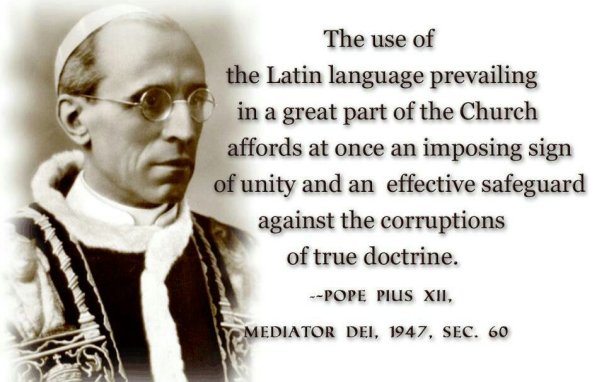The Latin Conference Every Priest Needs to Know About
“The program of priestly formation is to provide that students also understand Latin well…” (Code of Canon Law 249)
From July 31 – August 6 the Catholic University of America in Washington D.C. will once again play host to the annual Veterum Sapientia Conference. As noted on their website:
Veterum Sapientia is a week-long Latin program for Catholic priests, seminarians, and those men and women belonging to religious orders. This program seeks to respond to the call of Saint John XXIII’s Apostolic Constitution Veterum Sapientia to revitalize the Latin language in the Catholic Church. This full-immersion (Latine tantum) program offers intensive instruction in the language to intermediate and advanced students of Latin.
For over fifty years Rome has been instructing bishops and seminary rectors alike of the necessity to teach Latin. From apostolic constitutions, to conciliar documents, to Canon Law, the Church has repeatedly addressed the importance of Latin as a component of priestly formation.
What has typically been the response by the episcopate to this request from Rome? Far too often bishops have willingly neglected this aspect of formation for the seminarians in their care. Indifference has unfortunately been the norm, as an entire generation of clergy received little to no training in the very language of Roman Catholicism.
That there is real value and a need for priests to understand Latin can be ascertained by simply looking to the writings of Saint John XXIII himself. In Veterum Sapientia, the 1962 Apostolic Constitution from which the conference takes its name, the Holy Father noted:
Finally, the Catholic Church has a dignity far surpassing that of every merely human society, for it was founded by Christ the Lord. It is altogether fitting, therefore, that the language it uses should be noble, majestic, and non-vernacular.
Saint John XXIII continues:
In addition, the Latin language “can be called truly catholic.” It has been consecrated through constant use by the Apostolic See, the mother and teacher of all Churches, and must be esteemed “a treasure … of incomparable worth.”. It is a general passport to the proper understanding of the Christian writers of antiquity and the documents of the Church’s teaching. It is also a most effective bond, binding the Church of today with that of the past and of the future in wonderful continuity.
The conference itself is aimed at intermediate to advanced students of Latin; those priests and religious who have already had two or more semesters of college level Latin. One of the primary speakers again this year is Monsignor Daniel Gallagher, a priest of the Diocese of Gaylord, MI and a Latinist currently serving in the English section of the Secretary of State office in the Vatican.
The below video provides a good introduction to the conference itself. Additionally, those interested in more information should go to the Veterum Sapientia website for testimonials, registration information, and other general questions.
THIS is the Latin conference every priest needs to know about!
Photo credit: FACEBOOK.COM/VERBATIM2012
Posted on July 3, 2016, in liturgy and tagged Catholic University of American, latin, Latin conference, Saint John XXIII, veterum sapientia. Bookmark the permalink. 6 Comments.



Question: In learning Latin different books take different approaches. In Classical Latin they have all the marks over the words. However, in many ecclesial Latin books these are not recorded. (However, some just have outright accent marks.) When learning Latin should the person spend a lot of time memorizing all these marks about the words? or NOT?
That’s a good question Fr. Pomeroy. I’m not much of an expert on Latin unfortunately, so I’m unable to answer you. My Latin is purely ecclesial and has been learned from attending the TLM and from the responses in the Ordinary of the Mass.
Unfortunately, the Church, faced with surviving in the Roman world, chose the language-Latin-of its hateful persecutors over the Inspired languages of Hebrew and Greek. IMO, a dreadful loss.
Thankfully Holy Mother Church disagrees. Of course, the Jewish political and religious leaders of first century Palestine also persecuted Our Lord…and we still include “Amen” and the “Hosana” in the Catholic Mass. It’s important that the same Latin spoken by Pilate was the Latin used by Constantine when Rome legally recognised the faith and took Christianity to the farthest reach of the empire.
In humility, please re-read what Saint John XXIII wrote in Veterum Sapientia and take it to prayer and to heart.
The answer to your question is a giant NON, from a teacher of Latin, Greek, and French in a highly reputable able Jesuit school.
1. Yep, St John XXIII was correct… it helps us connect with the past writers of the Church, BUT it does not help one communicate with the present world where very few people speak Latin or read Latin. Latin is a dead language. Great for historical uses and analusis of language roots (good for linguists), but for the rest…
2. A conference ONLY for priests and religious and seminarians?? Really?? So what happened to the rest of the Church? We are not good enough for such a conference. This sounds like a conference with a ‘political agenda’ or social agenda in which the non-ordained or non-religious are not good enough to be invited…
3. Maybe the Church and its leaders should move to the new international language of the age… English. As I travel, I am amazed how many people speak and read and write English around our world. Latin was only written and spoken in the Mediterranean area. English has become the world’s most dominant language.
Latin is good for academic study, but it is no longer a unifying language. It has become (based on my above remarks) a language of separation rather than unity. Only religious, priests and seminarians need apply, while laity are not invited. That is separation not unification.